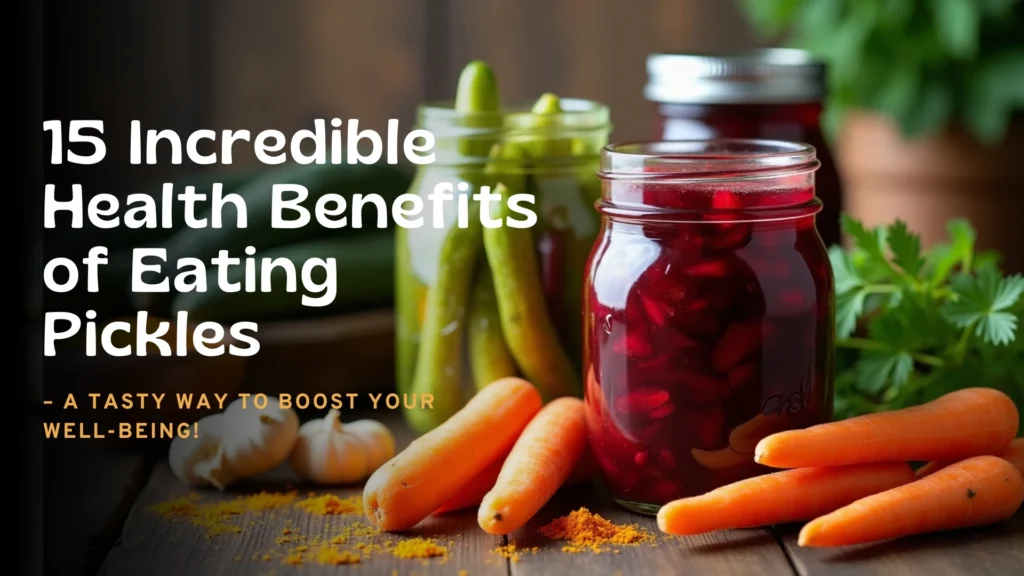Pickles have been a beloved part of many cuisines around the globe for centuries. These tangy, flavorful, and occasionally spicy snacks are more than just condiments or side dishes; they also provide a range of health benefits. Created by preserving vegetables or fruits in a mixture of vinegar, salt, and spices, pickles undergo fermentation, which boosts their nutritional value. This article delves into the various advantages of including pickles in your diet and how they can enhance your overall well-being.
1. Rich in Probiotics for Gut Health
One of the key advantages of consuming pickles is their rich probiotic content. Fermented pickles, particularly those made with brine, are packed with beneficial bacteria that promote digestive health. These probiotics:
Enhance gut flora and maintain a balance of good bacteria Assist in digestion and improve nutrient absorption Alleviate symptoms of bloating and indigestion Bolster the immune system by supporting gut health.
2. Improves Digestion
Pickles, especially the fermented varieties, are great for digestion. The lactic acid produced during fermentation aids in breaking down food, making it easier for the body to absorb nutrients. Moreover, pickles encourage the production of digestive enzymes, which help in breaking down complex carbohydrates and proteins.
3. Boosts Immune System
A robust immune system begins with a healthy gut. Since pickles are rich in probiotics, they help sustain a balanced gut microbiome, which is essential for immune function. By promoting gut health, pickles may assist the body in warding off infections and illnesses.
4. Aids in Weight Management
Incorporating pickles into a weight management plan can be beneficial. The vinegar found in pickles is associated with weight loss by:
Boosting metabolism
Curving appetite
Minimizing fat storage
Encouraging a sense of fullness
5. Provides Essential Vitamins and Minerals
Pickled vegetables maintain many of their original nutrients, making them a valuable source of essential vitamins and minerals. Here are some common pickled items and their benefits:
Cucumbers – High in vitamin K, which is important for bone health
Carrots – Packed with beta-carotene, supporting vision and immune function
Beets – A great source of folate, iron, and antioxidants
6. Helps in Blood Sugar Regulation
Research indicates that vinegar, a primary ingredient in many pickles, can help regulate blood sugar levels. It enhances insulin sensitivity, which helps to prevent spikes in blood sugar after meals. This makes pickles a smart food choice for those with diabetes or anyone looking to keep their blood sugar levels in check.
7. Improves Hydration and Electrolyte Balance
Pickles are high in salt, which plays a key role in maintaining the body’s electrolyte balance. For athletes or those involved in vigorous physical activities, pickles can help:
Prevent muscle cramps
Restore lost sodium and potassium levels
Support proper hydration
8. Supports Brain Health and Mood Regulation
The connection between the gut and brain is well-established, and fermented foods like pickles can have a positive impact on mental health. The probiotics found in pickles may influence serotonin production, aiding in mood regulation and helping to alleviate stress and anxiety. Regularly eating pickles could lead to better cognitive function and emotional well-being.
9. Rich in Antioxidants for Overall Health
Pickles are packed with antioxidants that help combat free radicals in the body. These antioxidants can:
Reduce inflammation
Reduce the likelihood of chronic illnesses, including heart disease and cancer.
Promote healthy skin by fighting oxidative stress.
10. Enhances Liver Function
Pickles, especially those prepared with turmeric and garlic, are beneficial for liver health. The antioxidants and anti-inflammatory properties found in these ingredients aid in detoxifying the liver and ensuring it functions properly.
11. Aids in Preventing Scurvy
Historically, pickles have been utilized to ward off scurvy, a condition resulting from a lack of vitamin C. Pickled vegetables preserve vitamin C, which is crucial for collagen production, immune system support, and wound healing.
12. Reduces Inflammation and Joint Pain
Pickles that include ingredients like turmeric and ginger possess anti-inflammatory qualities. They can help alleviate joint pain and inflammation, making them advantageous for those suffering from arthritis or other inflammatory issues.
13. Improves Heart Health
Certain pickled foods, such as beets and garlic, play a role in promoting heart health by:
Lowering cholesterol levels
Reducing blood pressure
Enhancing circulation
Incorporating these types of pickles into your diet can support cardiovascular health and lower the risk of heart disease.
14. Enhances Skin Health
Pickles are packed with essential vitamins and minerals that support healthy skin. The antioxidants found in pickles help fight skin aging, reduce acne, and enhance skin elasticity. Moreover, fermented pickles contribute to a healthy gut, which is closely linked to achieving clear and radiant skin.
15. A Natural Remedy for Hangovers
Thanks to their high sodium and electrolyte content, pickle juice serves as an effective remedy for hangovers. Consuming pickle juice aids in rehydrating the body, replenishing lost minerals, and easing hangover symptoms such as headaches and nausea.
Conclusion
Incorporating pickles into your diet can provide numerous health benefits, including improved digestion, a stronger immune system, better heart health, and effective weight management. Whether you choose fermented or vinegar-pickled varieties, they offer vital nutrients, antioxidants, and probiotics that enhance overall well-being. However, it’s crucial to enjoy pickles in moderation due to their elevated sodium levels. Adding pickles to a balanced diet can be a tasty and beneficial way to boost your health.
So, the next time you savor a crunchy, tangy pickle, keep in mind that it’s not just a delicious snack—it’s a treasure trove of health benefits!
